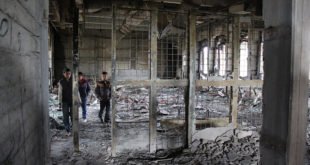In an exclusive interview, Ally McBeal co-executive producer Alice West talks to David Chambers for a six-months-later perspective on the role Hollywood might play post-September 11.
see related article: Will Hollywood Go to War?
David Chambers: Ms. West, during the panel on December 5 last year, Jeff Zucker, president of NBC Entertainment, stated, "We are not culpable for the images we portray on television. News informs the American public and keeps our politicians honest. Entertainment entertains the American public. The point is that we do it freely. Saturday Night Live made fun of Osama Bin Laden, as did Jay Leno and David Letterman. That's what great about this country, that we can do that." What is your take on Zucker's comment: should Americans take responsibility for the images they portray on TV, to American or other audiences?
West: How do you mean?
Chambers: Well, I remember a few years ago Barry Norman of BBC Film interviewing Oliver Stone when Natural Born Killers came out. Mr. Norman cited several instances of violence and death which involved people immediately after viewing that film and asked Stone whether he felt any responsbility: Stone said no. Do you agree with Stone?
West: I think there is always a degree of responsibility, but I think that is always very, very dangerous, because you don't want to lose your freedom [of artistic expression]. It's the same thing as when they've tried to make recording artists responsible in those situations when teenagers have tried to act out based on what they allegedly heard [in the songs of recording artists]. I personally would not go see Natural Born Killers. The point is, you have the choice to see it or not see it.
Chambers: During the panel, you explained how, like most TV series, the current shows of David E. Kelley Productions were already 5-6 episodes into the new season by 9/11. In The Practice, however, you would deal with 9/11-related issues like the constitutional rights of races. In Ally McBeal, however, because Ally simply has her own inner world unaffected by things like 9/11, the show would not portray Ally thinking about 9/11. Yet, even though Ally herself may live in her own, the show Ally McBeal does deal with real-life personal issues such as obesity or racism, she does have a real job, and they deal with legal clients with real problems. Why couldn't Ally or a colleague be deeply touched by such a giant world event and spend some time asking some of the questions posed during the panel by Bryce Zabel and Mort Rosenblum?
West: We don't talk about 9/11 in an overt way, but it is referred to occasionally in a script, like "Since 9/11" There are those kinds of references to it, but it is not something our characters sit down to and discuss at length.
TBS: Why not?
West: I think that might bring us too much into the real world. We have referred to it in an episode, and that "9 1 1" episode is one of our proudest episodes. I thought we dealt with it all quite well at the time. [In the "9-1-1," Episode 97, which aired December 10, 2001, Ally helps a minister who was fired from his church for not believing in God, dating from the time of his wife's brutal murder. Meanwhile, John takes a case opposite a mayor who cancelled the Christmas parade of his town due to a disaster in which people died. Very moved, John proves that Christmas is what they need the most in this time of deep grief.]
You look at the other shows that are going on that are comedy—and we are a comedy, don't forget, even though we are also in the drama category—and they have not done it. It's very difficult. Part of it is because, don't we all want the world to feel somewhat the same. There is some comfort in that. We're not ignoring it, but we are not going to sit down and talk about it [on the show].
Chambers Were you aware that Ally McBeal has been aired on two regional TV channels, one out of London called MBC and the other out of Hong Kong on a channel in the STAR-TV network?
West: Yes, I do know that.
Chambers: People in countries like Iran and Afghanistan have figured out ways to hide their satellite dishes. And during the panel, you expressed deep concern and sympathy for Afghanis, particularly Afghani women. Since you know that some number of Afghanis, including Afghani women, have most likely seen your show, what do you hope their reaction is?
West: Hope!
Chambers: Zabel asked panelists, "How are we perceived, as a concern to our Industry?" and then stated, "There is a message we can send to the American public; there is also a message we can send overseas." Would you consider developing new TV shows that have not only American but foreign audiences in mind?
West: That is not something that I personally do, develop new shows. Still, I think that budgets have gotten so much tighter since 9/11, since the economy was damaged, but I don't know how that works. All the pilots I have heard about are being done in the tradition sense. I don't know in this new season of pilots whether they have looked at foreign divisions of their media empires for co-financing of any of shows. It's a good question.
Chambers: What do you think Afghanis would make of a TV series like CSI? [The series features the night shift of Las Vegas crime scene investigators (CSI) and how they use science to solve crimes.] What relevance would such a show have for them?
West: I have no idea. Their culture is so different from ours, I would not feel qualified to answer that. I would hope that they would get that we are caring and not as evil as we are made out to be.
Chambers: Do you think that is part of the role of American TV?
West: Yes, I think that is part of the role.
Chambers: What are other parts?
West: I don't know
Chambers: If you recall during the panel, we saw a clip from the Emmy Awards when the master of ceremonies Ellen DeGeneris said, "I'm in a unique position as host, but just think about it: what would bother the Taleban more than seeing a gay woman in a suit surrounded by Jews?—I like to do my part!"
West: And on Ally McBeal, you've got a bright, successful woman attorney in short skirts.
Chambers: Right—so is thumbing our noses or blowing raspberries at Osama and the Taliban an effective response?
West: I don't know.
Chambers: For whom might that be effective? Is it cathartic for Americans because it's just good comedy plain and simple?
West: I think that's part of it. Also, I think it's about education, showing people that everything is not one-sided, to be able to see both sides of the situation.
Chambers: How about a woman on in a village on a remote Afghan moutainside?
West: I can't even begin to understand what their life is like. We all know what we see on the news and read in the papers. The hardship that those people are enduring that are unfathomable. We may be showing them things that are simply unattainable—I don't know.
Chambers: If Hollywood is making more and more money on films at foreign box offices, with dumbed down dialogue and heavy action that needs no translation, what is American TV doing in terms of creating content that has international audiences in mind? And what could American TV do to open up Americans to content that involves the rest of the world? With 9/11, Americans have learned that the global village is not a one-way street and that it includes sharing the world's woes. In that case, is there any kind of education and awareness raising that might enter American TV content?
West: It's only six months since the incident. As a country, we are still reeling. But I think that will happen. In the episodic world, we are so far ahead of today, we are shooting episodes to air two and three months down the line. But I don't know how it is going to appear on television.
 Arab Media & Society The Arab Media Hub
Arab Media & Society The Arab Media Hub




